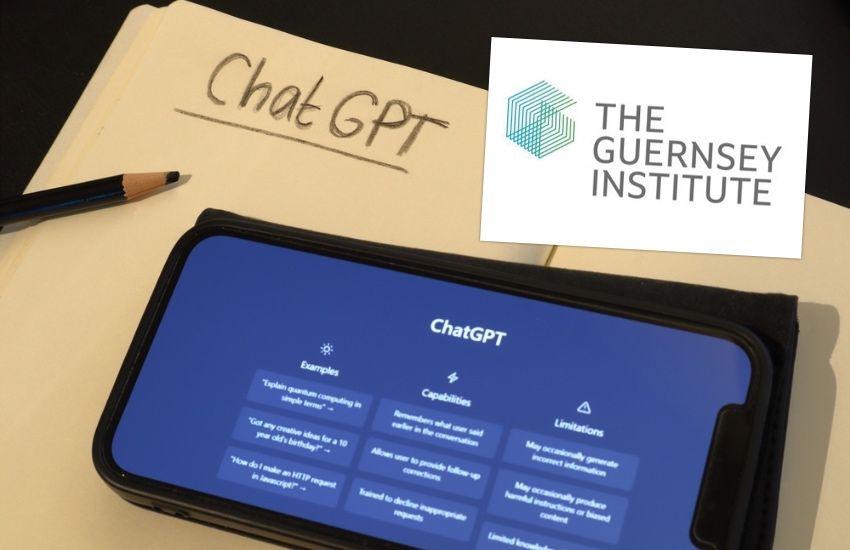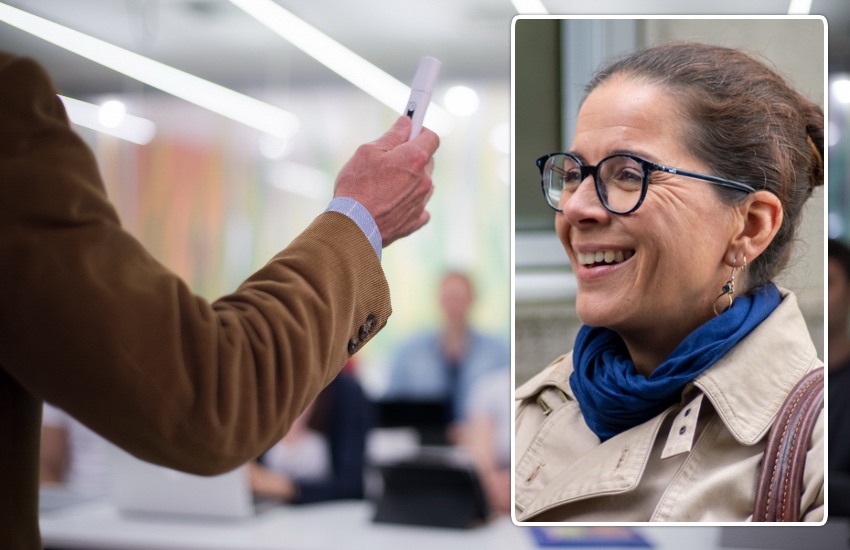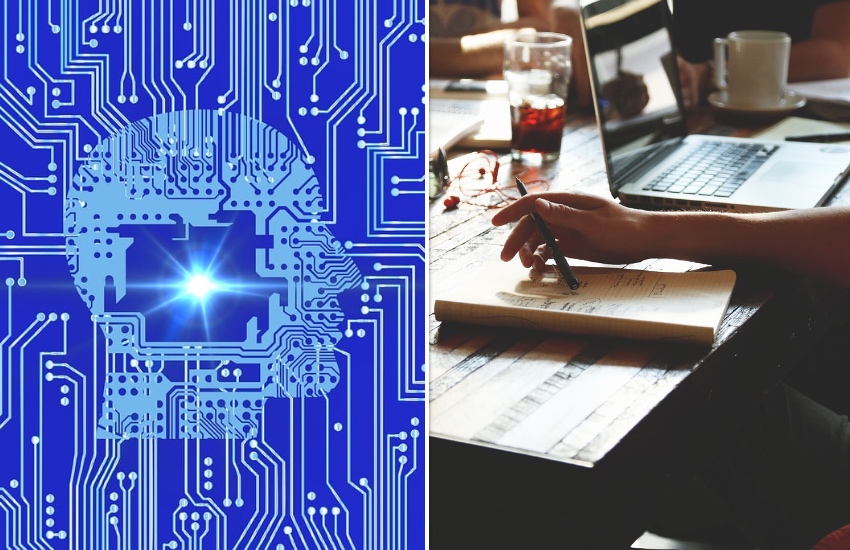


The Guernsey Institute is full steam ahead with embedding AI to benefit students and teachers, while some quarters of the academic establishment have mongered that it may spell the end of human staff and proliferate cheating.
Directives from examination boards and teachers associations have begun streaming through to speed up understanding of the technology and its implications, ever since advanced generative AI exploded onto the scene late last year.
The Times reported last week on a group of leading education practitioners warning against the huge threats artificial intelligence poses to student wellbeing and the teaching profession. They also urged governments to ensure students are placed ahead of large education technology providers’ interests.
But senior staff at Guernsey’s College of Further Education – which provides post-16 vocational training – see more opportunity than threat to learners and lecturers alike.
While fears of mass cheating exist, they believe the technology could result in better educational and professional outcomes for students with more rigorous, tailored assessments.

Pictured: The Guernsey Institute comprises the post-16 vocational college, health & social care studies, and the GTA University Centre.
Rachel Guilbert, Librarian and Information Services Manager, who is focusing on the ethical use of AI, said: “It could really push students in the right direction, which is about being inquiring and having critical thinking skills, because you have to have those abilities to use AI effectively."
Martine Ellis, Professional Development Manager and Scholarly Activity lead, who focuses on staff training agreed: “I think it's important that as teachers we're going to respond to whatever is going on in the world and in the economy. And we will change our teaching to equip others with whatever they need,” be it in finance or horticulture.
Ms Guilbert said, despite headlines in the international media, her perspective is that “the education establishment is quite split on this. Several universities have banned it.
“Personally, and based on our research, we don't believe that is the right way to go. Simply because they will just use it at home. Wouldn't it be better to teach them how to use it properly and correctly rather than try and stop it altogether, particularly because we’re so career focused here at College?”
They both praised the senior leadership of the Institute, which has let them get on with advising lecturers and amending College policy to suit, but they have been directed to move quickly to keep pace with the speed of innovation in the AI sector.
In discussions with lecturers on the ground they found that many of them were already using AI in pockets: “So we've been trying to bring that all together”, Ms Ellis said.
Some of the recommendations for the next term include embedding practices into work plans to save time, and modifying inductions so teachers are confident in talking about AI and “setting expectations” for how students use it.
They noted that the States of Guernsey are yet to issue directives to government, but they feel as though their organisation is ahead of the game.

Pictured: Education President, Deputy Andrea Dudley-Owen told Express that the impact of AI within schools has been discussed within committee.
Ms Ellis has already created a bank of articles and videos to help all teachers learn more: “They've got to understand the tool first before they can then effectively support their students in the correct use."
Assessments are an area that will need to be adapted, with redesigns pending. Ms Guilbert said: “I don't mean turning it into an exam, because that's kind of a lazy way of doing it. But it's looking at how you can make the assessments more individualised, local, perhaps more difficult for someone to just plug into an AI and get an answer out."
That could drive up standards through more robust assessment of knowledge and understanding, she added.
The developments have also been identified as a positive from the teachers union perspective.
Ms Guilbert, who is part of the College’s union, said, while they haven’t received much detail from head office, the implications for workload are “generally viewed as potentially helping”.
She said overworking has been “one of the largest issues that the union has been facing in recent years - in the UK and over here.
“I don't think it's a silver bullet for workload, but I think it could help with some of the issues, particularly around planning.”
AI assistance in marking work has been cited as a positive, but they argued the real benefits are in planning, researching, and general resourcing.
“The union view on marking is that there's a lot of over marking, anyway, and that creates a workload issue,” Ms Guilbert added.

Pictured: AI is likely to help teachers manage their workload and free up time for more practical tasks.
Using the tech won’t be a case of students not applying critical thinking skills. It’s the opposite in their view.
The hope is to encourage students to deploy the new tools to assist their learning, by outlining key concepts, for example. But specific human skills, like critical thinking and an enquiring mind, are necessary to get the most out of the process.
Ms Ellis argued: “The quality of the output is only as good as what you put in. From a student perspective, the student must have listened, understood, synthesised a bunch of information in order to provide ChatGPT with a really strong prompt."
“You've got to have strong literacy skills as well as to draft a decent prompt… it's a good four or five paragraphs outlining the scenario,” Ms Ellis added.
She said this equates to “outsourcing the ‘doing’ rather than the thinking".
Nevertheless, Ms Guilbert said she is yet to see students using the nascent technology effectively.
“Some of them are still quite wary of it because I think there's been so much in the media about it. I think some of our students are actually wary of using it because they're worried they're going to misuse it,” she said.
IT and engineering students have already taken good interest in it, with the former group asking to attend a seminar on AI in assessment which was supposed to be for staff only.
“They apparently asked some really good questions about the implications of AI, and because they do a unit on the impact of computing, this ties in with the subject area,” she said.

Pictured: Students will be encouraged to use the tech ethically and responsibly.
Improving accessibility and personalising learning is an immediate change that can benefit students, they said, with certain applications already identified to help a wide range of academic abilities.
“I am very excited about the possibilities for differentiations for students,” Ms Guilbert said. “We looked at something called Audemic… I think that's going to be helpful for teachers who are struggling to meet the needs of certain students.
“It will take something like a journal article, or a very academic piece of writing and it will use AI to either summarise, or it can put it into more basic English, or it can read it out to you. So, as you can imagine that it makes it so much more accessible.”
Ensuring students from lower socio-economic backgrounds can access the new technology is a consideration, but help is already available following years of innovation. Many local schools provide personal digital devices to students.
Ms Guilbert said it's always a barrier if students can’t use technology at home, but fortunately many now have mobile phones. If not, the College can direct them to resources.
“I will take the same approach I have done with research and referencing generally, which is ensuring that every student has access to support for that.”

Pictured: AI will affect the job market by increasing competition for vacancies, but not necessarily replacing large numbers of roles.
Contemporary research has shown that white collar jobs are likely to see more disruption from AI tools, particularly in data analysis and writing, but also in medicine. Trained algorithms have shown to be better placed to detect abnormalities in X-rays at a far faster rate than any human.
But Ms Ellis believes the human capacity for creativity is often necessary for breakthrough in industry, including healthcare.
She said there are certain sapien skills which are “not easy to outsource”.
“So maybe we focus more on those kinds of get a creative approach to a thing rather than looking at the entry level skills. Most of the big advances in medicine have come from a creative leap that AI isn't really capable of doing, because it is rehashing things that already exist.”
Creative thinking may receive a boost on the back of AI, but creative products are under more threat.
Ms Guilbert noted that “obviously art and AI is a huge... so I think that it's definitely put the whole art industry into turmoil, hasn't it?
“That's been an industry that has met AI with some degree of fear understandably. But having spoken to the lecturers about it, they do see some opportunities there as well.”
Artistic expression would become more accessible too, Ms Ellis said.
Ms Guilbert added: “Those jobs will still exist, but they will probably look very different. So, I think provided we give the students the skills to continue learning and being flexible in their mindset, I don't think that's necessarily a problem.
“Human beings are quite well equipped to be flexible in the face of technological advances. It's only ever speeding up, but we've dealt with an awful lot.”
Comments
Comments on this story express the views of the commentator only, not Bailiwick Publishing. We are unable to guarantee the accuracy of any of those comments.